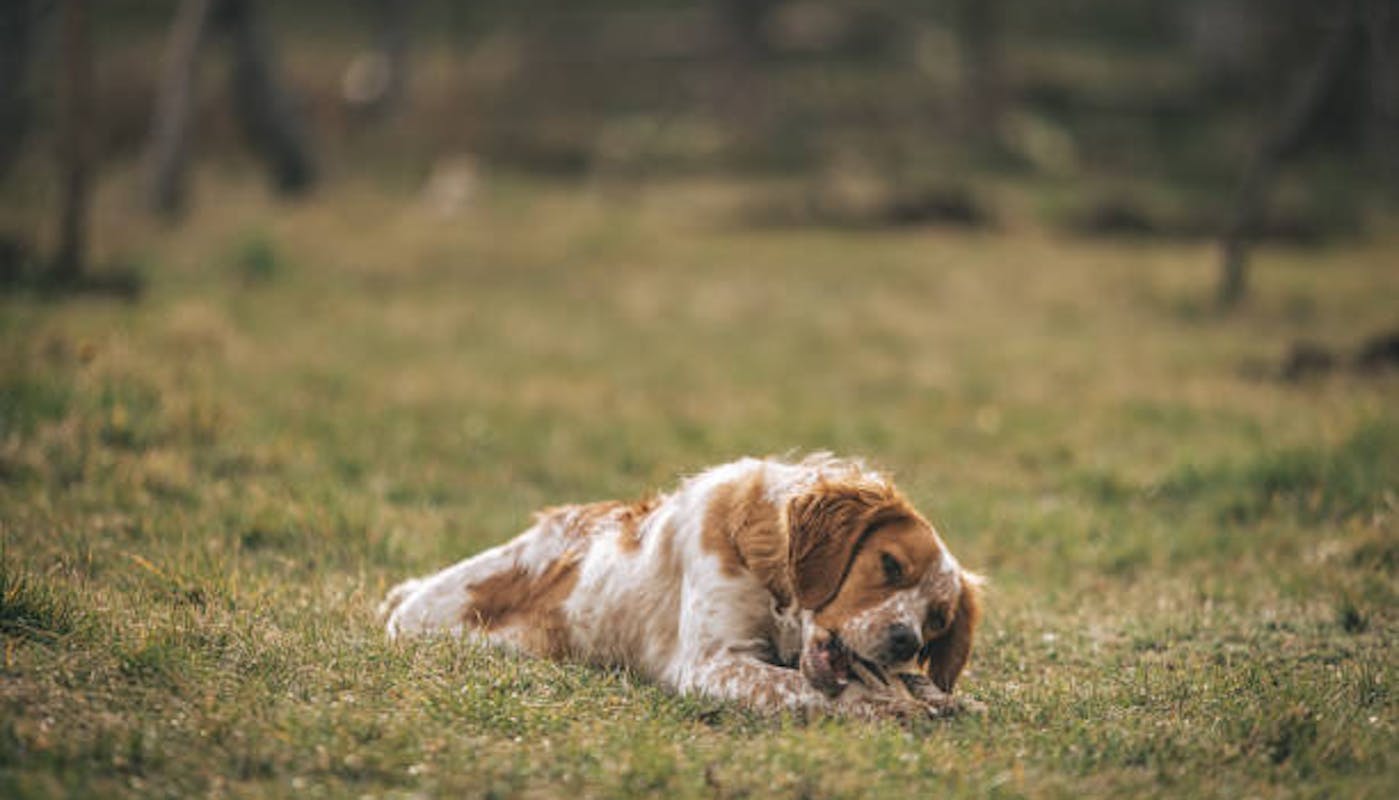What Should You Do If Your Pup Eats A Chicken Bone?
What Should You Do If Your Pup Eats A Chicken Bone?
One of the first things we learn about dogs, even as children, is that they love bones. Movies and cartoons show them happily gnawing on bones and dog toys and treats are made in the shape of bones. If you’ve ever given your own dog a bone to chew on you’ll know the rumors are true – dogs really do love bones. But that doesn’t always mean they’re good for them.
So before you go feeding your pup the leftover carcass from your Sunday dinner, you should know the dangers of cooked chicken bones for dogs. In this blog we’ll explain why dogs can’t eat chicken bones, what to do if an accident happens and they manage to eat something they shouldn’t, and the different kinds of bones your dog actually can eat.
Can Dogs Eat Chicken Bones?
The short answer is no: dogs cannot eat chicken bones. This is because they are soft and become brittle when cooked. So as your dog chews on the bone it can break and splinter in their throat, puncture their gastrointestinal tract, or cause them to choke.
Obviously, this is painful and can cause serious complications and even death. While uncooked bones from a raw chicken might not cause quite the same level of disruption, they’re still prone to splintering so it’s best to stick to ‘no chicken bones’ as a rule of thumb.
What Can Happen If My Dog Eats A Chicken Bone?
Though chicken bones are soft enough to dissolve in your dog’s stomach acid, by this point the damage is likely to have already been done. Chicken bones are small so they can be a choking hazard and, as we already mentioned, they can splinter and damage the esophagus if your dog hasn’t chewed them enough before swallowing.
1. Obstructing the esophagus
Larger chicken bones, like the thigh, are just the right size to get lodged in a dog’s throat if they were to swallow without chewing it down to just the right size. This can cause gagging and retching or, if it manages to make its way down further to the pharynx, has the potential to block the airway. This can cause your dog to stop breathing and will be very painful, so they should be taken to the vet immediately.
2. Tearing the gastrointestinal Tract
Splintered chicken bones can cause tearing and other damage in their stomach. This will be very painful and is considered a medical emergency so, again, they should be taken to the vet immediately.
3. Contamination
Some human food is especially prone to bacterial contamination and chicken is one of them. So while you might think raw chicken is a tasty treat for your pet, you could be exposing them to diseases like Salmonella. For this reason it’s best to avoid raw chicken bones, even though they’re less likely to pose a splintering hazard.
What Do I Do If My Dog Eats A Chicken Bone?
How you respond to your dog eating a chicken bone depends on their immediate reaction. Taking them to the vet might seem like the obvious first port of call – and it is if they’re choking or showing signs that they’re struggling to breathe. However, rather than panicking, try to remain calm and review the situation. In many cases your dog will chew and digest the bone with no issues at all.
If you can get the bone away from your dog or out of their mouth and throat without getting bitten or causing them undue stress then attempt to do so. If they’re carrying on as normal, stay calm and keep an eye on them. If they seem stressed or begin showing any of the following symptoms, take them to the vet:
- Gagging or retching
- Drooling
- Coughing
- Trouble breathing
- Vomiting
- Diarrhea
- Loss of appetite
- Lethargy
Avoid making them vomit, as this will present another opportunity for the bone to tear the esophagus.
What Bones Can Dogs Eat?
Though bones are often marketed as one of the best dog treats, even larger bones like those from cows can pose a risk to your pet. Though sturdier animal bones are harder to break down into sharp splinters, small sharp pieces can cause damage when swallowed.
The shape of rib bones can get caught in the top of your dog’s mouth and hollow bones like knuckles can get stuck around their jaw. Bone marrow also contains high levels of fat so, while you might think it’s a good natural protein for your dog, it could actually be causing them to gain weight and even develop pancreatitis.
So, if you’re looking for the best way to feed your dog a tasty treat that’s packed with all the raw animal-based goodness they need to stay healthy, you might find that bones actually aren’t the best option.
Front of the Pack’s freeze-dried treats are made with 100% animal protein in three tasty flavors: rabbit, salmon, and beef. They’re totally natural and have that jerky-like texture that gives them something tough to get their teeth into without the risk of splinters. So rather than bone, why not try a chewy treat that provides that great animal taste without any health hazards.
